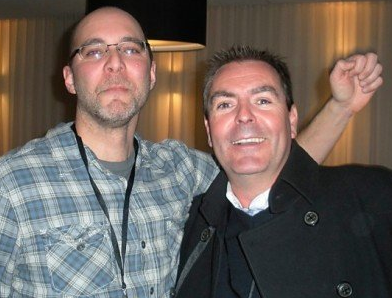Real Excitement
This past Saturday as part of the trulondon Unconference event, Keith Potts and Felix Wetzel graciously hosted several of the conference attendees as their guests at an English Premier League match, Portsmouth vs. Stoke City.  Keith Potts and Steve at the match
Keith Potts and Steve at the match
Here is the connection between the HR and Recruiting event and the match: Keith is one of the founders and Felix is a Director of a company called Jobsite, the largest job board in the UK and a sponsor of trulondon as well as the shirt sponsor of Portsmouth Football Club.
If you are not terribly familiar with shirt sponsorship, I took a quick run at describing the idea here.
But the real point of the post is not simply to thank Keith and Felix for the tremendous experience, which I assuredly do, but rather to talk for a moment about the passion and excitement that we observed from both the Portsmouth supporters as well as the many Portsmouth FC staff that we encountered on our visit.
From the start of the game to the final whistle, the majority of the Portsmouth fans sang, chanted, and banged on drums to support and exhort their team. This singing and chanting was entirely organic, and required no artificial prompting from the Public Address announcer. There were no 'Let's Make some Noise' displays on the giant videoboard. There were no heavy metal or hip-hop tunes blared to try are create a lively or fun atmosphere. And there was not a hint of a 'kiss-cam'. Bottom line: there was no fake excitement.
And in total, it was by far the best sporting event I have ever attended.
This match, and I suspect many matches in the league, substitute spectacle for authenticity, replace contrived enthusiasm with genuine passion, and connect with supporters, club employees, and the community at large in a way that at least to me was unique and remarkable.
I understand that sports, especially major-league, big time sports have little to do with how the overwhelming majority of organizations operate. But there are, I think, some interesting lessons and potentially some insights that can be learned from sports and in particular how teams exist and interact in a complex environment of internal and external stakeholders.
Community
The football club, and the other organizations that are part of its support network are to a large extent deeply intertwined in the local community. Match days are significant events, some sponsors like Jobsite are also significantly vested in the community, and in many ways the club, the experience, and the network help to define and shape the area. For organizations, striving to find ways to become more vested in their locak communities can often yield extremely positive results.
Passion
Passion for a sports team is often deep, unwavering, and endures over the years. For organizations, engendering that same kind of passion can prove difficult if not impossible. But the passion for your products and services, your employee value proposition, and your brand are what could sustain you when times get hard, and external economics play against your. Teams in the English league can get 'relegated' for poor performance (send down to a lower tier and status league), but the support and passion of the fans tends to remain. The most successful organizations can find a way to generate this passion across its constituencies for the long term.
Togetherness
After the game (which sadly for Portsmouth was a 2-1 defeat) the various employees from the Director of Operations to the cooks, waiters, and bar staff at the club were all noticeably and understandably  saddened and dissapointed. But in their seemingly collective pain, I really got the sense that they were still 'together' and really bound by their shared mission, desire, and hopes for the the future. While without exception every employee that I encountered at the Club did their jobs with skill and efficiency, they were also mindful of the bigger picture. And they were seemingly invested heavily in that picture. Do your job and support the overall goals and objectives of the organization at the same time.
saddened and dissapointed. But in their seemingly collective pain, I really got the sense that they were still 'together' and really bound by their shared mission, desire, and hopes for the the future. While without exception every employee that I encountered at the Club did their jobs with skill and efficiency, they were also mindful of the bigger picture. And they were seemingly invested heavily in that picture. Do your job and support the overall goals and objectives of the organization at the same time.
The interesting thing is that attention to and care of these areas can in some ways overcome some poor results on the field (and even off the field). Portsmouth is at the bottom of the league standings and is even in danger of the UK equivalent of bankruptcy. And while the immediate future looks a bit harsh, I have every confidence based on the people we met, and the support and passion we witnessed that the club will make it through.
Thanks so much once again to Keith and Felix and to all the great people at Portsmouth FC.

 Steve
Steve

